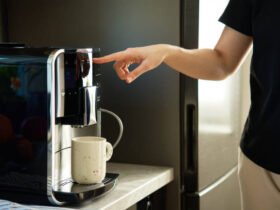If you’re a coffee lover, you know the struggle. The aroma of fresh coffee in the morning can be irresistible, yet somehow, when brewed at home, your coffee never seems to match that barista-quality cup from your favorite cafe. But fear not! This post is here to guide you through the maze of coffee-making to help you understand why your coffee at home may not taste as good and what you can do to change that.
This article will explore the nuances of coffee making, from bean selection to brewing techniques. By the end, you’ll have a clear understanding of how to enhance your home coffee experience and make every cup as delightful as those you buy.
The Mystery of Coffee Taste
Have you ever wondered why your home-brewed coffee doesn’t compare to the one from your local coffee shop? It all starts with understanding the complexity of coffee flavors and aromas, which are influenced by several factors.
Bean Quality Matters
The quality of coffee beans is the foundation of any good coffee. While local cafes often source high-quality beans, many home brewers don’t prioritize this aspect. Investing in quality beans can significantly impact the taste of your coffee. Beans have different flavor profiles depending on their origin, roast level, and freshness.
When choosing beans, look for ones that are freshly roasted. Beans lose flavor over time, so it’s best to use them within a couple of weeks from the roast date. Different regions produce beans with unique flavors; for example, African beans often have fruity notes, while South American beans are known for their nutty and chocolatey flavors.
Grinding Techniques
The grind size and consistency also play a significant role in the taste of your coffee. Cafes have commercial grinders that deliver precise grind sizes, which most home grinders struggle to replicate.
If your grind is too coarse, your coffee may taste weak and watery. On the other hand, if it’s too fine, the coffee could turn out bitter and over-extracted. Investing in a good quality grinder and experimenting with different grind sizes can help you find the perfect balance for your taste.
The Role of Water
Water is another critical component in coffee-making, often overlooked by home brewers. Tap water can contain impurities that affect the taste of your coffee.
Using filtered water can enhance the flavor, as it removes chlorine and other unwanted minerals. The temperature of the water also matters—ideally between 195°F and 205°F. If the water is too hot or too cold, it can impact the extraction process and the final taste.
Brewing Methods and Their Impact
Different brewing methods can significantly alter the taste of your coffee. Understanding each method’s nuances will help you choose the right one for your palate.
Drip Coffee Makers
Drip coffee makers are common in households but often fail to reach the ideal brewing temperature, resulting in under-extracted coffee.
To improve your drip coffee experience, ensure your machine is clean and well-maintained. Consider pre-wetting the coffee grounds for better extraction and use a medium grind for optimal flavor.
French Press
The French press is favored for its full-bodied flavor. However, if not executed properly, it can lead to a gritty cup.
To perfect your French press skills, use a coarse grind and steep the coffee for about four minutes. Avoid over-steeping, as it can cause bitterness. Pour out all the coffee immediately after brewing to prevent over-extraction.
Espresso Machines
Espresso machines are an excellent choice for those seeking a strong, concentrated coffee. However, they require some skill and practice to master.
Ensure your machine is well-calibrated and clean. Use finely ground coffee and tamp it evenly to allow for proper extraction. Fine-tuning your espresso skills can greatly improve your home coffee experience.
The Importance of Storage
Proper storage of coffee beans is vital to maintaining their freshness and flavor. Exposure to air, moisture, heat, and light can degrade the beans quickly.
Airtight Containers
Store your coffee beans in airtight containers to protect them from air and moisture. Glass jars and ceramic containers can be good options, but make sure they have a reliable seal.
Avoiding Heat and Light
Keep your coffee away from direct sunlight and heat sources. A cool, dark pantry is often the best place to store your beans.
Freezing Coffee Beans
While some suggest freezing coffee beans to extend their shelf life, it’s worth noting that repeated exposure to temperature changes can cause condensation and affect the flavor. If you choose to freeze your beans, divide them into small portions, and thaw only what you need at a time.
Enhancing Flavor with Additions
Sometimes, even the best-brewed cup could benefit from a little extra flavor. While purists might prefer their coffee black, there are numerous ways to customize your cup.
Spices
Adding spices like cinnamon, nutmeg, or cardamom can introduce new flavors to your coffee. Simply sprinkle a small amount into your coffee grounds before brewing.
Milk and Creamers
Milk can smoothen and enrich the flavor of coffee. Experiment with different milk types, such as almond, oat, or soy milk, for unique flavor profiles.
Sweeteners and Syrups
If you enjoy a sweeter coffee, try adding natural sweeteners like honey or maple syrup. Flavored syrups can also be a quick way to add variety to your coffee routine.
Common Mistakes to Avoid
Even seasoned home brewers can fall into common pitfalls that affect the taste of their coffee. Here are some mistakes to avoid:
Overlooking Cleanliness
Residue and oil build-up in your coffee maker can impact flavor. Regular cleaning is essential to prevent off-flavors.
Ignoring Measurements
Proper coffee-to-water ratio is crucial for consistency. Use a kitchen scale to measure your coffee and water accurately.
Rushing the Process
Good coffee takes time. Rushing the brewing process can lead to uneven extraction and disappointing results.
Conclusion and Next Steps
Brewing great coffee at home is both an art and a science. By paying attention to each step—from selecting quality beans to mastering your brewing technique—you can transform your home coffee experience and enjoy a cup as satisfying as those crafted by your favorite barista.
Ready to elevate your coffee game? Start by investing in quality beans and a good grinder. Experiment with different brewing methods and don’t shy away from trying new flavors. For more tips, consider joining coffee forums or participating in online brewing classes.
FAQs
Why does my coffee taste bitter?
Bitter coffee often results from over-extraction, which can occur from using a fine grind or brewing for too long. Try adjusting your grind size or reducing the brewing time.
Is it worth investing in an espresso machine for home use?
An espresso machine can be a worthwhile investment if you love espresso-based drinks. They offer control over the brewing process but require practice and maintenance.
How long do coffee beans stay fresh?
Coffee beans are freshest within two weeks of roasting. Proper storage in airtight containers can extend their freshness for up to a month.





